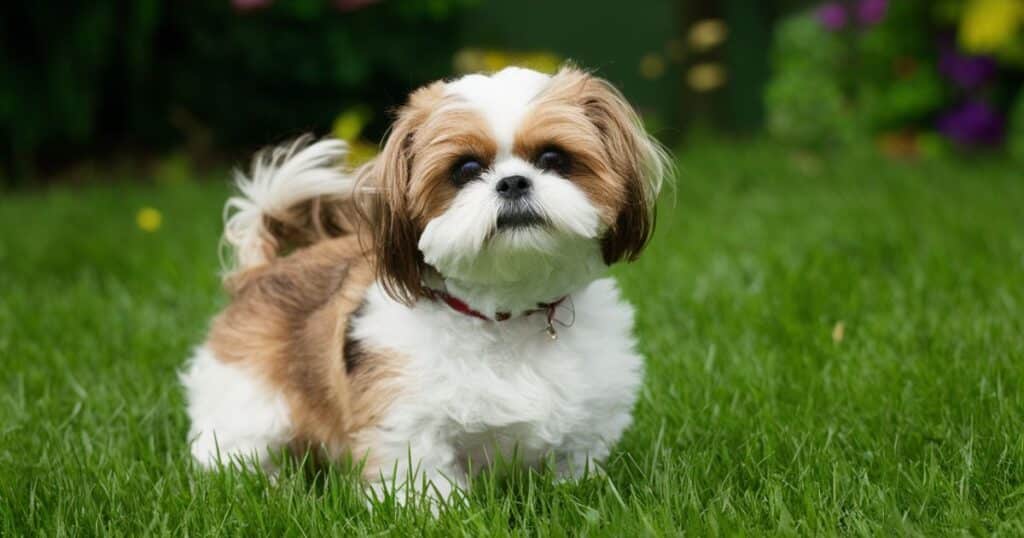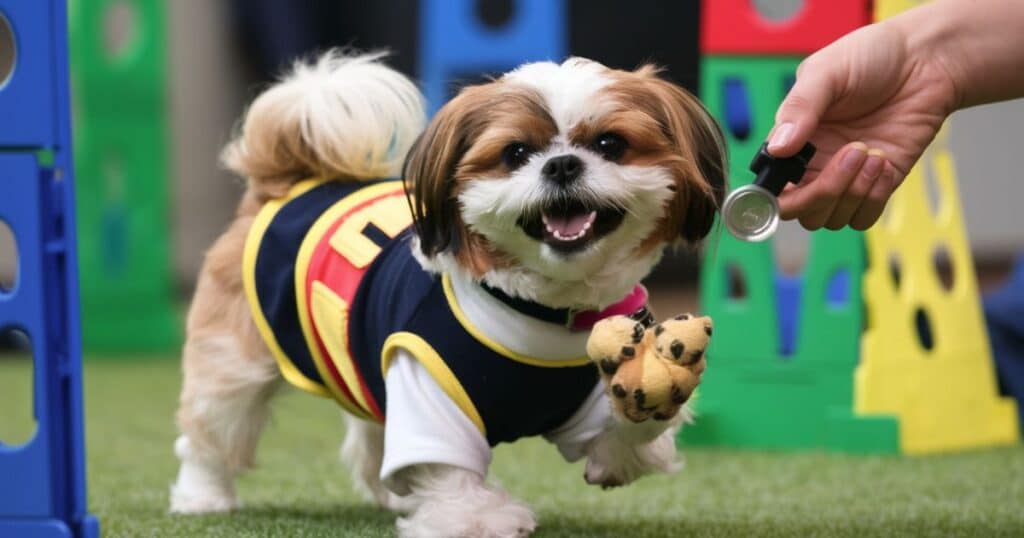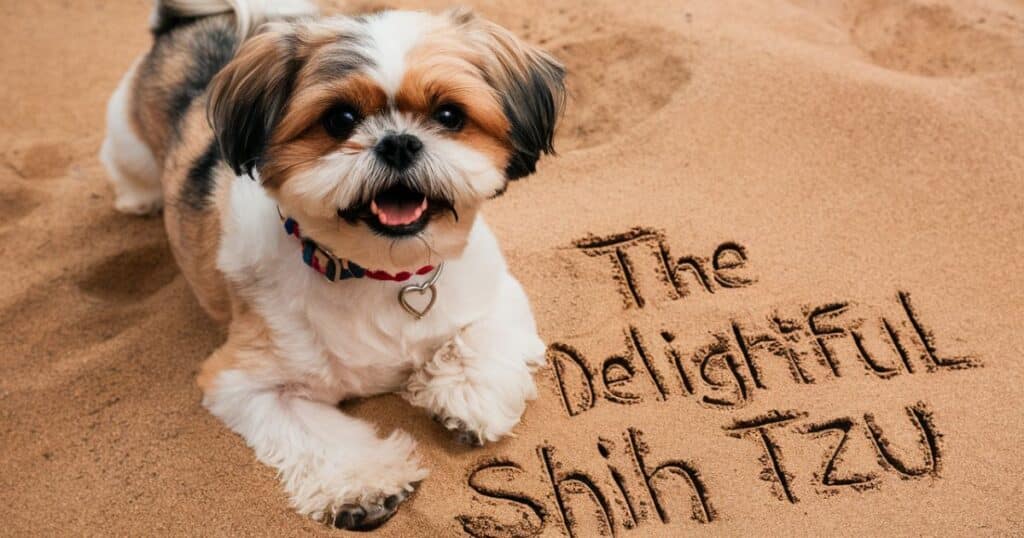The Shih Tzu is an ancient breed that has captured hearts worldwide with its adorable looks and charming personality. Originally companions to Chinese royalty, these little lions have become beloved companion animals in modern times.
If you’re considering adding one of these lively, playful pups to your family, this comprehensive guide covers everything you need to know about the Shih Tzu, from grooming needs to health and general care.
Breed Overview
Shih Tzu Highlights
- Small size: 9-16 pounds, 8-11 inches tall at the shoulder
- Long, luxurious double coat in various colors
- Friendly, affectionate temperament
- Lively and playful, yet calm indoors
- Ideal for apartment life and family households
- Average lifespan: 10-16 years
Shih Tzu History
The Shih Tzu is an ancient Tibetan toy breed that has been a cherished companion dog for over a thousand years. Their name translates to “lion dog,” reflecting their resemblance to the Chinese Buddhist lion. Originally owned by Chinese royals, these dogs were highly valued and rarely seen outside the palace grounds.
It wasn’t until the 1930s that the breed gained popularity in England and later in the United States. The American Kennel Club recognized the Shih Tzu in 1969, and they have since become one of the most popular toy breeds and small dogs worldwide.
ALSO READ: The Joy Of Labrador Retriever Puppies: A Complete Guide
Shih Tzu Characteristics
Physical Appearance

The Shih Tzu is a toy-sized, brachycephalic (short-nosed) breed with a distinctive appearance. They have a compact, sturdy body covered in a long, luxurious double coat that can be found in various coat colors and patterns, including:
- Black
- White
- Black and white
- Red
- Brindle
Their eye-catching round eyes, short muzzle, and floppy ears only add to their adorable looks. The Shih Tzu’s luxurious hair can grow to floor-length if not trimmed, giving them a regal, eye-catching appearance.
| Shih Tzu Size | Weight | Height |
| Small | 9-16 lbs | 8-11 inches |
Temperament and Personality
Despite their small size, Shih Tzus have big personalities! They are known for being happy, lively, friendly, and affectionate companions. Their gentle, docile nature makes them great family pets, especially with proper socialization.
While playful, Shih Tzus are also calm indoors and content to lounge around with their humans. They crave attention and do not do well when left alone for extended periods.
Average Lifespan
One of the delightful qualities of the Shih Tzu is their impressive life expectancy. With proper care, these small dogs can live 12-16 years on average, making them one of the breeds with the longest lifespans. Providing regular veterinary check-ups, a healthy diet, and ample mental/physical stimulation can help your furry friend thrive into their senior years.
Shih Tzu Care
Training and Exercise
While intelligent, Shih Tzus can be stubborn at times, so positive reinforcement and patience are key during obedience training. Start socialization and basic training early to build a strong foundation.
Despite their small size, Shih Tzus have moderate exercise needs and enjoy daily walks or playtime. However, they are prone to respiratory issues, so avoid strenuous activity, especially in hot weather.
Be prepared for potential training hiccups like:
- Barking
- Difficulty housebreaking
- Stubbornness
But with consistency and positive reinforcement methods, most Shih Tzus can overcome these behavioral issues.
Grooming (including shedding)
The gorgeous flowing coat is one of the Shih Tzu’s most distinctive features, but it requires regular grooming. Their dense double coat means Shih Tzus are moderate, year-round shedders, so frequent brushing is a must to prevent matting and excessive hair around the home.
Grooming needs for a Shih Tzu include:
- Brushing 2-3 times per week (daily for show dogs)
- Bathing every 3-4 weeks
- Regular trimming around the face, ears, and feet
- Nail trims every 4-6 weeks
Many owners opt for keeping their Shih Tzu’s coat trimmed in a “puppy cut” for easier maintenance, while others prefer the full, flowing look achieved through more extensive grooming.
Diet and Nutrition
Providing a high-quality, protein-rich diet is crucial for your Shih Tzu’s overall health and energy levels. Look for dog foods with lean protein sources like chicken or fish, as well as healthy fats like omega-3 and omega-6 fatty acids.
Proper meal portions are also important, as Shih Tzus are prone to obesity. Follow your veterinarian’s recommendations based on your dog’s age, activity level, and any health conditions.
Supplements for muscle and joint health may also benefit senior or less active Shih Tzus.
Living with Shih Tzus

Shih Tzus make wonderful companions for all types of living situations, from apartments to larger homes, as long as they receive ample attention and quality time with their humans. They adapt well to indoor living but still need daily exercise and mental stimulation.
One important consideration is their tendency to experience separation anxiety when left alone for too long. Crate training, doggy daycare, or having a friend/family member check in can help prevent destructive behaviors.
Shih Tzu Health Issues
Like any breed, Shih Tzus are prone to certain health issues, especially as they age. Being aware of these conditions can help you provide the best care and catch any problems early.
Some common health concerns in Shih Tzus include:
- Obesity (proper diet and exercise are crucial)
- Luxating patellas (kneecap issues)
- Periodontal disease and other dental problems
- Hip dysplasia
- Eye problems like dry eye or entropion
- Liver shunts
- Ear infections (due to floppy ears)
- Glomerulonephropathy (kidney disease)
- Brachycephalic syndrome (respiratory issues)
While this list may seem daunting, many Shih Tzus live long, happy, and healthy lives with proper preventative care, regular vet visits, and genetic testing from reputable breeders.
What To Feed a Shih Tzu
How To Feed a Shih Tzu
Establish a consistent feeding schedule for your Shih Tzu, offering 2-3 meals per day. This breed does best with a slow transition when changing to a new dog food to avoid digestive upset.
Always choose a high-quality dog food brand formulated for small breeds. Look for ingredients like:
- Lean protein sources
- Whole grains or grain-free carbs
- Healthye
How Much Should You Feed a Shih Tzu?
Shih Tzus are prone to obesity, so monitoring their meal portions is crucial. The amount you feed will depend on your dog’s:
- Age
- Activity level
- Metabolism
- Whether they are spayed/neutered
Generally, most Shih Tzus will thrive on 1/2 to 1 cup of high-quality dry food per day, split into two meals. But follow your veterinarian or dog food’s feeding guidelines based on your pup’s individual needs.
Be mindful of calorie-dense treats as well, which should make up no more than 10% of their daily intake. Using lower-calorie options like fresh veggies can satisfy your Shih Tzu’s cravings for snacks.
Nutritional Tips for Shih Tzu
To keep your furry friend happy and healthy, consider these nutritional tips:
- Feed an age-appropriate diet (puppy, adult, senior)
- Choose dog foods fortified with omega fatty acids for skin/coat health
- Add glucosamine and chondroitin supplements for joint support
- Incorporate fresh foods like boiled chicken, yogurt, veggies in moderation
- Avoid highly processed human foods, which can lead to pancreatitis
Proper nutrition lays the foundation for your Shih Tzu’s overall well-being and longevity. Adjust portions as needed to maintain an ideal body condition.
Behavior and Training Tips for Shih Tzu
Shih Tzu Training

Obedience training is recommended for all Shih Tzus from an early age. Establishing yourself as the firm, consistent “pack leader” while using reward-based techniques like treats and praise helps build a strong foundation.
This breed responds best to positive reinforcement methods like clicker training rather than harsh corrections or punishments. Be patient and keep training sessions short but frequent.
Fun Activities for Shih Tzu Dogs
While lower energy than some breeds like Border Collies or German Shepherds, Shih Tzus still need regular activity to stay mentally and physically engaged. Great options include:
- Short daily walks
- Playing catch or fetch
- Agility training
- Puzzle toys and food dispensing games
- Accompanying you on errands
Providing appropriate outlets for their energy levels and intelligence through physical activity and mental stimulation prevents boredom and unwanted behaviors.
Shih Tzu Grooming Guide
Skin and Coat Care
Proper coat maintenance is essential for the gorgeous flowing coat of the Shih Tzu. At minimum, this includes:
- Brushing 2-3 times per week to prevent tangles/mats
- Bathing every 3-4 weeks
- Trimming fur around eyes, ears, paws as needed
- Blow drying after baths to keep coat looking its best
- Using a high-quality dog shampoo/conditioner
Be sure to brush all the way down to the skin, not just the outer coat. This prevents painful matting and improves air circulation to the skin.
Many owners opt for a puppy cut to reduce intensive grooming needs. But for the full long coat, professional grooming every 6-8 weeks is recommended.
Eye Care
Those large, soulful Shih Tzu eyes require special care to prevent uncomfortable irritation and tear staining. Weekly cleaning with a damp cloth and dog-safe eye wash solution helps remove any gunk or discharge.
If you notice excessive tearing, redness, squinting or any unusual discharge, get your pup checked for potential eye issues.
Adopting or Buying a Shih Tzu Dog
Getting a Shih Tzu
Whether you choose to get a Shih Tzu puppy from a reputable breeder or adopt an adult rescue dog, being a responsible owner starts before you bring your new family member home.
If going the breeder route, be prepared for a potentially lengthy waiting list and higher costs than other breeds (often $1,000-$3,000). Research ethical breeders who prioritize health testing of parent dogs.
Adopting an older Shih Tzu has its benefits, like bypassing the very demanding puppy stage. Many adult rescues are already house-trained and have some basic training.
No matter which route you take, have your home properly puppy-proofed and be prepared for the time commitment of crate training, socialization classes, and general supervision required for a new companion.
Shih Tzu Rescues
There are numerous advantages to adopting a Shih Tzu from a rescue organization or shelter, including:
- Lower costs (often $300-500 for an adult dog)
- Knowing you’re providing a second chance
- Many rescues are already spayed/neutered
- You can meet the dog’s temperament first
While mixed breed “Shih Tzu mixes” are more common in rescues, you may still find purebred Shih Tzus available too. Rescue staff can guide you through the adoption process.
Shih Tzu Breeders

For those set on getting a Shih Tzu puppy, locate a responsible breeder who prioritizes the breed’s health and temperament over profits. Signs of a reputable Shih Tzu breeder include:
- Providing references from prior puppy buyers
- Showing health certifications for parent dogs
- Allowing you to meet the puppy’s parents
- Willingness to answer all your questions thoroughly
- Breeding dogs with the ideal breed characteristics
Be prepared to be screened as well, as ethical breeders want to ensure their Shih Tzus are going to a responsible, loving home. While more expensive upfront, a well-bred puppy has a lower risk of genetic issues down the road.
Ideal Environment and Humans for a Shih Tzu
Shih Tzus thrive as indoor companion pets with moderate exercise needs, making them well-suited for apartments, homes with small yards, or families with limited mobility. Their small size and lack of excessive barking means they often do well in multi-family housing situations.
While loving with everyone, Shih Tzus form extremely strong bonds with their primary owners. They do not do well when left alone for extended periods and are happiest accompanying their “people” everywhere.
For this reason, this breed is best suited for households with someone home for the majority of the day or able to bring their dog along on daily outings and errands. Retirees, remote workers, and families with at least one stay-at-home parent are ideal fits.
Final Thoughts
The Shih Tzu is truly a beloved and versatile companion dog. With their outgoing personalities, moderate energy levels, and lower grooming needs compared to other long-haired breeds, it’s no wonder these “little lions” rank among the most popular small dog breeds worldwide.
While generally healthy, being aware of potential issues like respiratory problems, dental disease, and luxating patellas allows Shih Tzu owners to properly manage and prevent many complications through diet, exercise, grooming and vet care.
ALSO READ THIS POST: Chocolate Lab Puppies: Dog Breed Facts, Essential Care, Traits & Expert Tips (2024)
FAQ’s
What is good and bad about Shih Tzus?
Pros: Affectionate, good for apartments, low-shedding, companion dogs. Cons: Require frequent grooming, prone to some health issues, may bark excessively, don’t do well alone.
What are some important facts about Shih Tzu dogs?
Small toy breed from Tibet, companions to Chinese royalty. Long double coats, can live 12-16 years with proper care. Known for friendly, lively temperaments. Ideal for families and indoor homes.
What do I need to know about having a Shih Tzu?
Require daily grooming and regular professional grooming. Need positive reinforcement training from an early age. Don’t tolerate being left alone for long periods. Prone to separation anxiety. Preventative vet care is important.
Can a Shih Tzu be left alone?
No, Shih Tzus do not do well when left alone for extended periods due to their companion nature. They are very people-oriented and can develop separation anxiety, barking, or destructive behaviors. Crate training, doggy daycare, or a pet sitter is recommended.

Davin Connor is an experienced author with 3 years in pets writing. Known for concise, informative content, he shares expertise on pet care, behavior, and health through his engaging articles.






